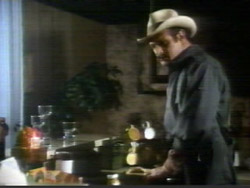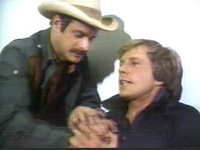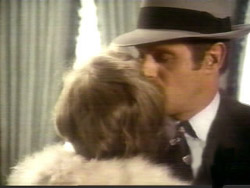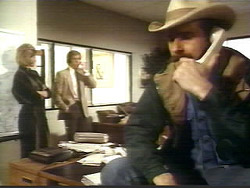|
Review:
Wow. Wow. Wow. I loved this episode!
Following the Dillinger legend as I have, it was fun to watch their take on the question
of Dillinger’s death. I’m glad they didn’t go so far as to make Dillinger responsible for the events of the episode, but I really liked the bit with the dentist’s father at the end.
That said, the
most noteworthy part of this episode was Jameson Parker’s performance. Again, wow. The scene with A.J., Rick, and Town in the racquetball court took my breath away. I don’t know what the actor thought of to cry like that, but…wow.
 Gerald McRaney also did a great job as
the older brother wishing desperately he could do anything to stop his baby brother’s pain. I think that Rick knew, even more than A.J. did, how deeply that
experience would affect him. And he would have moved heaven and earth to spare him that pain. None of this was in the dialogue, but it was skillfully
portrayed by the two actors. Amazingly well done. Gerald McRaney also did a great job as
the older brother wishing desperately he could do anything to stop his baby brother’s pain. I think that Rick knew, even more than A.J. did, how deeply that
experience would affect him. And he would have moved heaven and earth to spare him that pain. None of this was in the dialogue, but it was skillfully
portrayed by the two actors. Amazingly well done.
Let me take a break here and wax rhapsodic about something I’ve noticed about the brothers over time. When Rick cries, I see the sorrow of a man who’s seen
too much, been hurt too much. (The first example that comes to mind is the end of What’s in a Gnome?) I empathize, but I know he’ll be okay. Rick is amazingly
well-adjusted for the weight they’ve put on his shoulders.
 However, when A.J. cries, I get the image of a lost
child who doesn’t know why he’s been hurt. Every instinct cries out to protect the blond boy from feeling pain, and that’s probably how Rick’s
felt his whole life. A.J. just seems defenseless. Maybe y’all feel different, but it comes across clear as day to me. However, when A.J. cries, I get the image of a lost
child who doesn’t know why he’s been hurt. Every instinct cries out to protect the blond boy from feeling pain, and that’s probably how Rick’s
felt his whole life. A.J. just seems defenseless. Maybe y’all feel different, but it comes across clear as day to me.
On to the scene a few hours later, as A.J. realizes how much he’s been affected. Rick can see it in his brother as clearly as he saw it in himself and others in Vietnam
and brushes off A.J.’s attempt to go it alone. It’s a strong scene, masterfully done.
These two scenes are why I watch this show.
 I also really liked what they did with the
aging secretary, Jewel. Although I was sorry to see the old-time clothing go to nothing, I appreciated that they didn’t make her that simple. Schizophrenics can
have rational moments when they’re medicated and it’s great that they show that. And, of course, Rick’s dance with her was incredibly sweet. He did it with
respect, not pity, and it was just…beautiful. Mac portrayed it with ultimate class. I also really liked what they did with the
aging secretary, Jewel. Although I was sorry to see the old-time clothing go to nothing, I appreciated that they didn’t make her that simple. Schizophrenics can
have rational moments when they’re medicated and it’s great that they show that. And, of course, Rick’s dance with her was incredibly sweet. He did it with
respect, not pity, and it was just…beautiful. Mac portrayed it with ultimate class.
Did I think A.J.’s attack on Kinneman was an act? Not for a minute. I think if Kinneman had given him half a reason, I believe A.J. would have shot him dead.
He’d lost something of himself to the fear in that racquetball court, and it was payback time. Anyone disagree?
Bottom line – great episode, incredible performances by J.P. and Mac.
 Only one…well, two things bothered me
plot-wise. First, the ‘five plus five’ or ‘five by five’ business. What did that have to do with anything? They made a pretty big deal of it to give no explanation of
what it meant in the end. And why make a distinction between ‘five plus five’ and ‘five by five’? They could have said ‘five by five’ all along and it wouldn’t have
changed a thing. If the explanation was in there somewhere and cut off by A&E, please enlighten me. Ends this loose get under my skin. Only one…well, two things bothered me
plot-wise. First, the ‘five plus five’ or ‘five by five’ business. What did that have to do with anything? They made a pretty big deal of it to give no explanation of
what it meant in the end. And why make a distinction between ‘five plus five’ and ‘five by five’? They could have said ‘five by five’ all along and it wouldn’t have
changed a thing. If the explanation was in there somewhere and cut off by A&E, please enlighten me. Ends this loose get under my skin.
Second, okay, the fake Dillinger angle was interesting from the viewer’s point of view, but I can’t conceive of why Kinneman would go to that much trouble to
cover his tracks. I mean, bringing Dillinger into it brought a big spotlight on what was going on. Why would an FBI agent want to be that high profile, especially if
he’s crooked? Logically, it just doesn’t sit right.
However, I can handle all the plot holes in the world for a chance to see the brothers having this deep an interaction. This one got five Camaros despite the
plot problems because I got goosebumps at the depth of the performances given, and my goosebumps are pretty selective. Wonderful, wonderful episode! You can see all of my captures here.
5 out of 5 Camaros
    
|